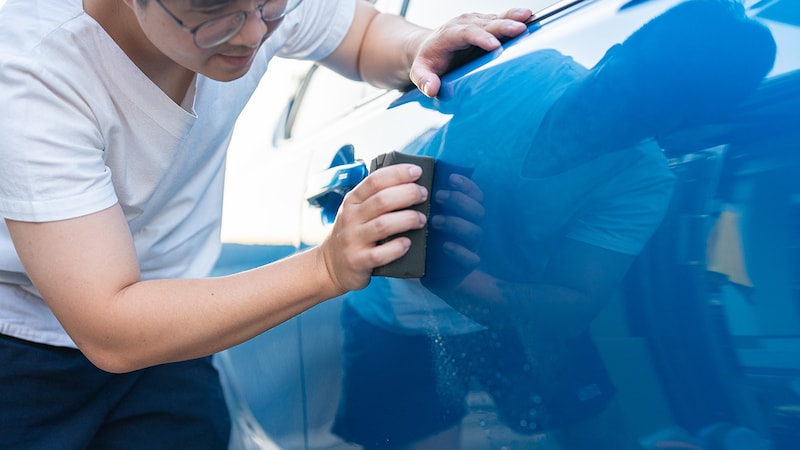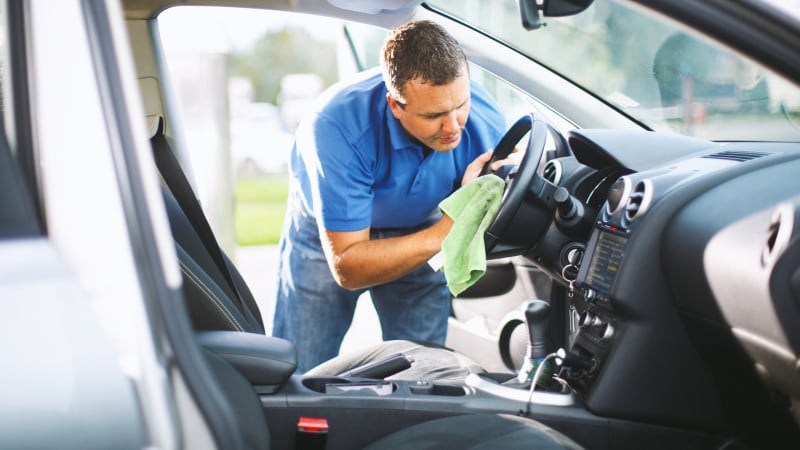Selling your car to a dealer

Quick insights
- Checking the value of your car prior to selling can help you choose the best offer.
- Cleaning the interior and exterior of your car before selling it to a dealer could make a better impression.
- You’ll need to bring your car’s title, warranty details and any other relevant paperwork.
Are you ready to sell your vehicle but hesitant because you don’t want the aggravation that comes along with it when selling to a private party? The paperwork, text messages, phone calls, emails, and don’t forget about the low-ball offers and knocks on your door. The process could take months and cost you more than it’s worth, especially if the vehicle needs any repairs.
You can avoid the hassle and instead take it straight to a professional. Here’s what to know before you consider selling your car to a dealer.
Checklist for selling your car
Before driving to the nearest used car lot, paperwork in hand, there are some preliminary steps to check off your list first. Whether you’re selling your vehicle outright, trading it in or unloading a junker, taking time to prepare could make the difference between getting a good deal or a crummy one.
Determine the value
There are numerous sites offering tools to check the value of your car, including Chase Auto. Keep in mind that the tools are only as useful as the information you submit, so be as accurate as possible when providing details about your vehicle.
Give your car a once-over looking through a buyer’s eyes. Check for scratches, dents and tears in the upholstery. Read through the descriptions given on the site, so you don’t assume your vehicle is in “excellent” condition when it’s only “fair.” Kelley Blue Book describes vehicle conditions as:
- Fair: The car has some cosmetic defects that require repairing or replacing.
- Good: The car has some cosmetic defects and is free of major mechanical issues.
- Very Good: The car has minor defects and is in excellent mechanical condition.
- Excellent: The car looks new and is in excellent mechanical condition.
Get your car ready to go
The trade-in value of your car is a starting point for dealers. It’s the baseline amount a dealership works from when negotiating an offer. However, if the vehicle needs repairs, the price might drop.
While you may not be able to fix every ding, gouge, scrape, or crack, you can make it look its best. Take it for a wash, wax and vacuum. If the dealer buys it, they’ll likely do a full detail before putting it on their lot. Still, first impressions matter, even when you’re selling to a dealer.
Gather your paperwork
One significant advantage of selling to a dealer is they take care of most of the paperwork for you. Bring your title, warranty and any service records you might have with you. If you’re still making payments on the car, then the lender holds the title. Call and get the balance owed and bring your loan information with you when you head to the car lot.
Find the right dealer
Auto dealers are in the business of selling, so you may wonder why a dealership would buy your car. Contrary to what many people believe, you can sell a car to a dealer without buying one first. All different kinds of dealerships purchase used cars, but finding the right one depends on the type of car you want to sell. Types of dealers to consider include:
- Manufacturer dealers: Some of the largest lots out there are major manufacturing sponsored dealerships that sell new and used cars. If your vehicle is a newer model in good condition, try taking it to a dealership that sells the same make. They have specialized knowledge and experience geared toward specific brands, and buyers come to their lots looking for a particular make.
- Used car dealers: One advantage of selling to a dealership that only sells used cars is it’s all they do. They aren’t worried about pushing new models and like to keep many used vehicles on-hand. Suppose you take your used car to a manufacturer dealer, they are likely to have several identical models already in their inventory, which could result in a lower offer. Before making the trip, check their website to see what cars they currently have.
- Instant cash offers: If you want to sell your car without leaving your house, an instant cash offer (ICO) company might be the way to go. You can request several ICOs at once, making it a breeze to compare offers. The proposals are time-sensitive, and the payment contingent on an accurate description. Regardless of how you want to sell your car, online companies are a great place to gauge how much your vehicle is worth.
Before visiting a dealership, call ahead to ask if they’re interested. If you target the right ones, you may get to choose from many different offers, and if you’re selling a popular model, you may have a bidding war on your hands. Unsure if you can sell a car that’s in need of repairs? In many cases, you can still sell your car; some companies even specialize in buying older vehicles.
Negotiate an offer
How much will a dealer pay for your car? The offer you get depends on the age and condition of your vehicle. Additionally, it relies heavily on the current selling price of similar brands on the market. The good news is if you’ve done your research and taken all the presale steps suggested, there probably won’t be much negotiating. If the dealership offers too little, choose another dealer.
Keep expectations in check
Selling your car to a dealership means eliminating numerous communications and marketplace emails. No meeting strangers in parking lots or trips to the state motor vehicle department. Just remember, taking an easier route means you might be sacrificing money for convenience.
In addition to your online research, turn to the trusted experts to find a dealership near you. Chase Auto's dealer locator can show you the way.



